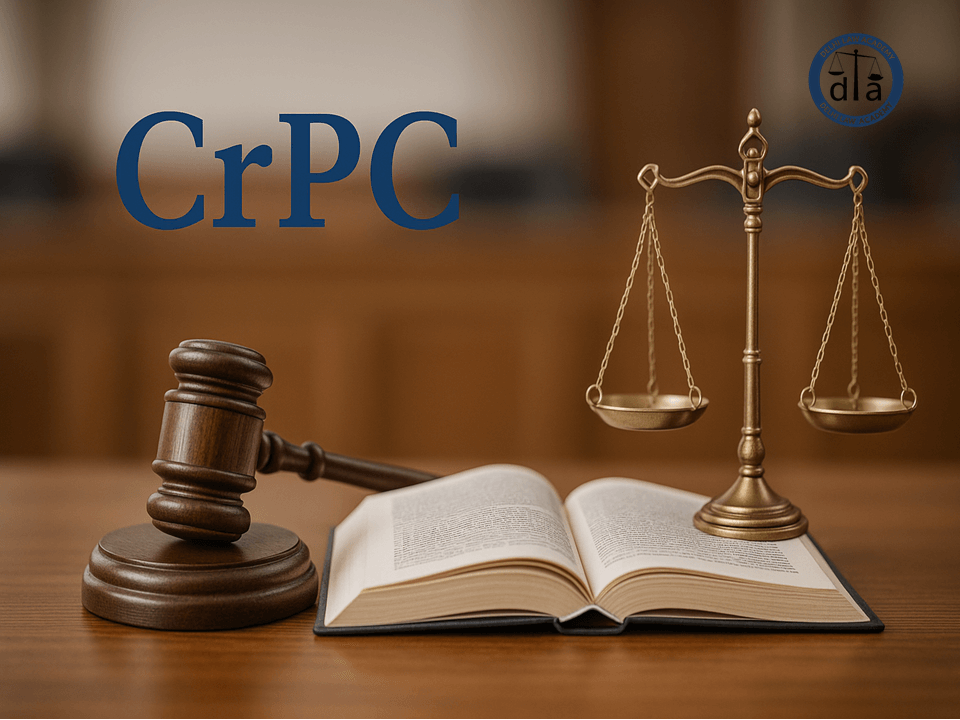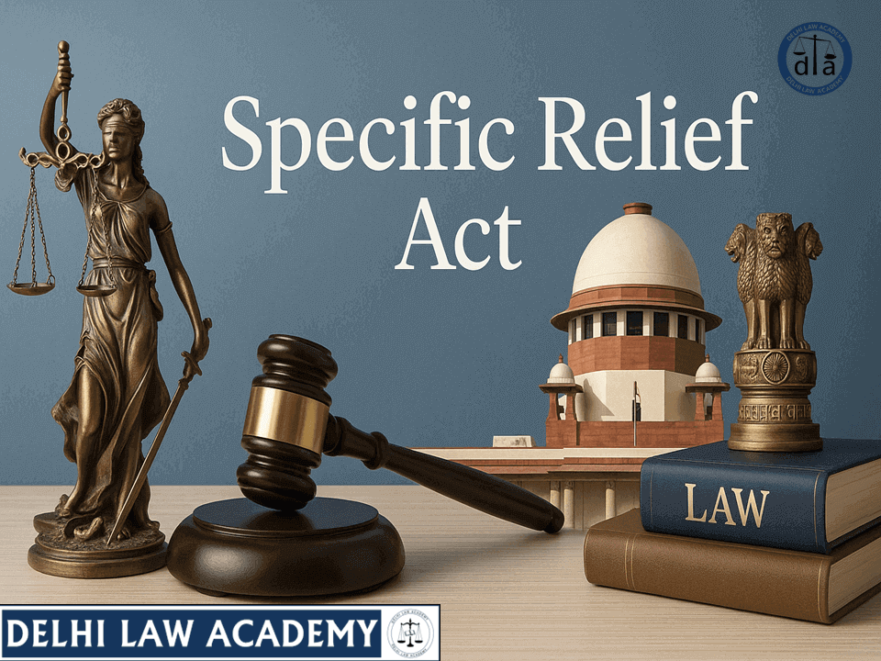
⚖️ CRIMINAL PROCEDURE CODE: RIGHTS OF ARRESTED PERSONS ⚖️
📘 TOPICS
- FUNDAMENTAL RIGHTS of arrested persons: Article 22(1), Article 22(2) of Constitution of India
- LEGAL RIGHTS of arrested persons: As contained in the Directions issued by the Supreme Court in Dilip K. Basu v. State of West Bengal [1997]
- STATUTORY RIGHTS of arrested persons: Granted by the Code of Criminal Procedure: Notice of appearance, Procedure of arrest, Control room at districts, Right of arrested persons: As contained in Section 41A, Section 41B, Section 41C and Section 41D
🏛️ LANDMARK CASES decided by the SUPREME COURT on this topic
- Dilip K. Basu v. State of West Bengal [1997]
🎯 Preparation for RJS, DJS, PCS (J) and other Judicial Service exams
CRIMINAL PROCEDURE CODE EXPLAINED
The Criminal Procedure Code forms the bedrock of any and every Judicial Service exam in the country. Its thorough knowledge is a must for all aspirants of RJS, DJS, PCS (J) and every other Judicial Service exam. To help such aspirants, DELHI LAW ACADEMY JAIPUR has launched a series of study material modules on all important aspects of this vital part of their syllabus:
⚖️ RIGHTS OF ARRESTED PERSONS
📜 Fundamental Rights of arrested persons:
Article 22(1)
- An arrested person shall not be detained in custody – without being informed of grounds of arrest
- An arrested person shall not be denied the right – to consult and to be defended by a legal practitioner of his choice
Article 22(2)
- An arrested and detained person shall be produced – before the nearest magistrate within 24 hours of arrest – excluding journey time from place of arrest to court
- No person shall be detained in custody – beyond the said period of 24 hours without authority of a magistrate
🕊️ The Fundamental Right of Life and Personal Liberty
- Granted by Article 21 and Guaranteed by Article 32:
- Article 21: No person shall be deprived of his life or personal liberty – except according to procedure established by law
⚖️ LEGAL RIGHTS of arrested persons:
- Directions issued by the Supreme Court in Dilip K. Basu v. State of West Bengal [1997]:
- Police personnel carrying out the arrest and handling interrogation of the arrestee should bear accurate, visible and clear identification and name tags with their designations.
- Police officer carrying out the arrest shall prepare a memo of arrest at the time of arrest. Such memo shall be attested by at least one witness, who may either be a member of the family of the arrestee or a respectable person of the locality from where the arrest is made. It shall also be countersigned by the arrestee and shall contain the time and date of arrest.
- A person who has been arrested or detained shall be entitled to have one friend or relative or other person known to him that he has been arrested and is being detained at the particular place.
- The time, place of arrest and venue of custody of an arrestee must be notified by the police telegraphically within a period of 8 to 12 hours after the arrest.
- The person arrested must be made aware of this right to have someone informed of his arrest as soon as he is put under arrest.
- An entry must be made in the diary regarding the arrest which shall also disclose the name of the next friend who has been informed of the arrest and names and particulars of police officials in whose custody the arrestee is.
- The arrestee should be subjected to medical examination by a trained doctor every 48 hours during his detention.
- The arrestee may be permitted to meet his lawyer during interrogation, though not throughout the interrogation.
- A police control room should be provided at all district and State headquarters, where information regarding the arrest and the place of custody of the arrestee shall be displayed on a conspicuous notice board.
📘 STATUTORY RIGHTS: Granted by the Code of Criminal Procedure
Section 41A – Notice of appearance [Inserted: Amendment Act 2008]
- Police officer shall issue a notice directing the person to appear before him – in cases where arrest is not required
- Where such a notice is issued – it shall be the duty of that person to comply with it
- Where such person fails to comply – police officer may arrest him
Section 41B – Procedure of arrest [Inserted: Amendment Act 2008]
- While making an arrest, a police officer shall – bear accurate and visible identification of his name – prepare a memo of arrest attested by a family member of arrested person or a respectable member of the locality where arrest is made and is counter-signed by the person arrested – inform the arrested person that he has a right to have a relative or a friend informed of his arrest
Section 41C – Control room at districts [Inserted: Amendment Act 2008]
- State Govt shall establish a police control room – in every district and at state level
- Names and addresses of persons arrested – shall be displayed on a notice board kept outside the control room in every district
- Control room at the state level – shall maintain a database for information of general public on persons arrested and nature of offences
Section 41D – Right of arrested persons
- When a person is arrested and interrogated by police: he shall be entitled – to meet an advocate of his choice during interrogation – though not throughout interrogation
This section was inserted by Criminal Procedure Amendment Act 2008 w.e.f. 1.11.2010
📚 Delhi Law Academy Jaipur – Your Partner for Judiciary Exam Success 📚
www.delhilawacademy.com
#judiciarypreparation #rjs #djs #judiciary #law
📚 Continue Your CrPC Preparation
Don’t stop here! Strengthen your knowledge of CrPC with our other fully solved tests:
📘 Free Study Material for Judiciary Aspirants!
Download our FREE study material prepared by Delhi Law Academy’s expert faculty.
💬 Frequently Asked Questions on Section 41 CrPC – Arrest Without Warrant
Section 41 CrPC allows a police officer to arrest a person without a warrant if that person commits a cognizable offence in the officer’s presence, or if there are reasonable grounds to believe they have committed such an offence. It ensures prompt action when judicial approval cannot be obtained immediately.
Police can arrest without a warrant when a person is suspected of committing a cognizable offence, obstructs a police officer, escapes lawful custody, or when credible information supports their involvement in a serious crime. This authority must be exercised with proper justification and respect for fundamental rights.
Section 41A CrPC mandates that before arresting someone for an offence punishable with less than seven years, police should issue a notice to appear. Arrest should only be made if the person fails to comply or if the officer records valid reasons. This provision protects citizens from unnecessary arrests.
The officer must disclose their identity, the grounds for arrest, and ensure the preparation of an arrest memo signed by the arrestee and a witness. The arrestee should also be informed of their right to inform a relative or friend about their detention.
No, as per Section 46(4) of the CrPC, a woman cannot be arrested after sunset and before sunrise unless in exceptional circumstances, and with the prior permission of a Magistrate. This rule safeguards the dignity and safety of women during arrests.
The person has the right to know the reasons for arrest, the right to remain silent, the right to consult a lawyer, and the right to be produced before a magistrate within 24 hours. These safeguards are enshrined in Articles 21 and 22 of the Constitution of India.
Contact us
📍 Delhi Law Academy – Jaipur Branch
6C, Tower 2, Coaching Hub, Pratap Nagar, Jaipur – 302033
📞 Phone:
+91 9911916552
+91 8447285606
✉️ Email:
contactus@delhilawacademy.com

